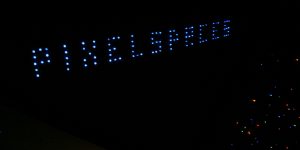Florian Berger
-
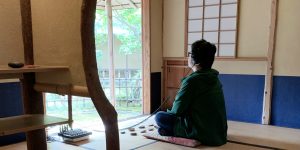
Future Citizen
Matsudo International Science Art Festival 2019
From November 16th to 17th 2019, the Ars Electronica Futurelab contributed to the International Science Art Festival in Matsudo, Japan, for the second time – with an “Ars Electronica Salon” on the theme of “Future Citizen”.
-
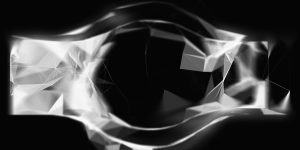
Lazarus
For the musical’s adaption of Lazarus for the Musiktheater Linz (English with German dialogue), the Landestheater Linz engaged in a special cooperation with the Ars Electronica Futurelab, in order to utilize media art to stage the material in a special contemporary appearance.
-
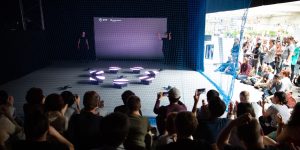
Open Futurelab 2018
Nach einer längeren Phase der Integration von Beiträgen aus dem Ars Electronica Futurelab an unterschiedlichen Schauplätzen des Festivals, sollte mit der Initiative Open Futurelab 2018 in der POSTCITY erstmals eine zentrale Schnittstelle für das kreative internationale Netzwerk des Labors entstehen.
-
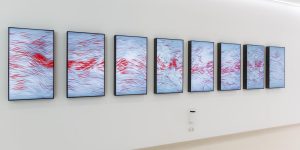
insight | out
insight | out, a work of media art by the Ars Electronica Futurelab, is a portrait of Oberbank AG Linz rendered on a fragmented frieze made up of eight video screens. The medium itself thus evokes the multiplicity of influences that flow into this portrait – the values that this long-established financial institution represents, the…
-
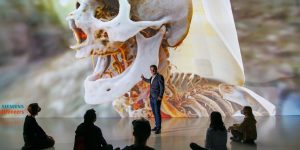
Cinematic Anatomy x Deep Space
Fotorealistische Anatomie überlebensgroß in 3D
Das mehrfach preisgekrönte Cinematic Anatomy x Deep Space führt MRT- und CT-Daten von realen Patient*innen zu fotorealistischen dreidimensionalen Bildern der menschlichen Anatomie zusammen. Organe, Blutgefäße, Muskeln, Sehnen und vieles mehr können überlebensgroß als dreidimensionale, gestochen scharfe Objekte aus allen Blickwinkeln betrachtet werden.
-
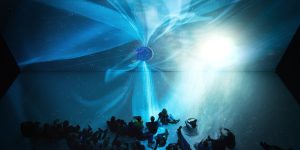
Deep Space 8K
The Deep Space 8K has received a major upgrade in 2022 – read all about the technical innovations as well as the latest programs on our Deep Space 8K EVOLUTION page!
-
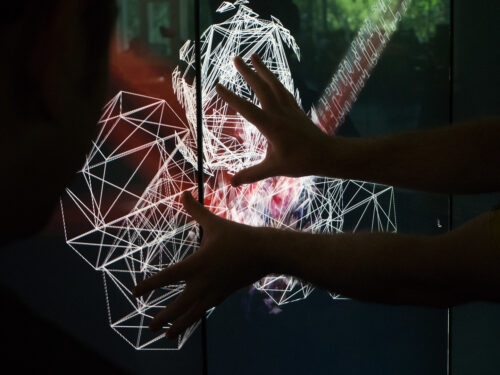
Soul of the Cube
Visualisierung von Campus-Aktivitätsdaten
Das Ars Electronica Futurelab entwarf eine künstlerische Anwendung für die interaktive Medien- und Lernumgebung The Cube an der Queensland University of Technology (QUT) in Brisbane, Australien, die die Stimmungslage am Campus visualisiert.
-
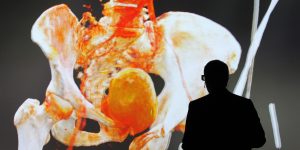
Virtual Anatomy & Pathology at Deep Space
A look back at the history of medicine quickly reveals that the graphic depiction of the human body and its internal organs has a very long tradition. Beginning with sketches rendered by hand all the way to x-ray techniques and modern digital methods like computer tomography (CT) and magnetic resonance imaging (MRI), the representation of…
-
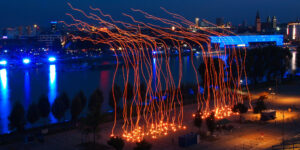
Spaxels
Drone shows and swarm art performances
Im September 2012 wurde am Linzer Donauufer ein neues Medium geboren: Der weltweit erste groß angelegte Outdoor-Formationsdrohnenflug erleuchtete den Nachthimmel als Teil und Herzstück des Open-Air-Musikfestivals Klangwolke.
-
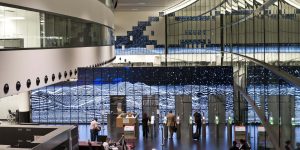
ZeitRaum
ZeitRaum (“TimeSpace”) is an interactive art installation the Ars Electronica Futurelab designed for the new terminal at Vienna International Airport. It creates real-time interpretations of arriving and departing flights.
-

Spaxels / Klangwolke – Quadrocopter
Ars Electronica Futurelab’s quadcopter swarm was one of the highlights of the 2012 voestalpine Klangwolke (Cloud of Sound) in Linz. More than 90,000 spectators lined both banks of the Danube to witness a then world record: a formation flight by no fewer than 49 quadcopters. Never before had such a large squadron of whirlybird drones…
